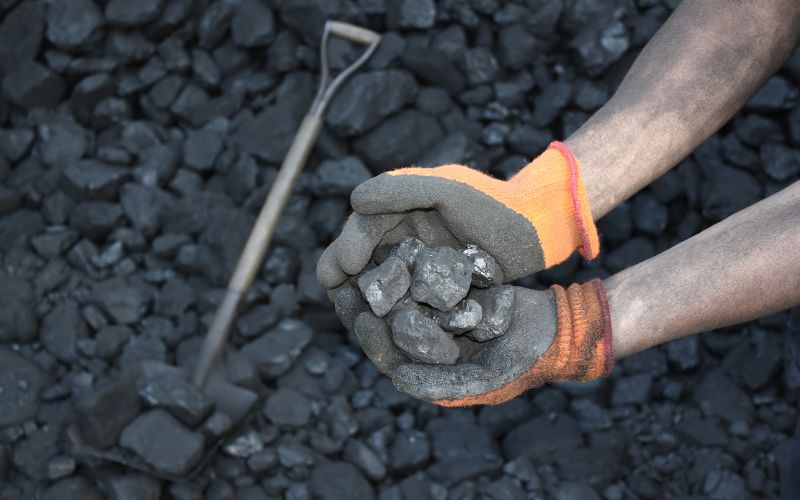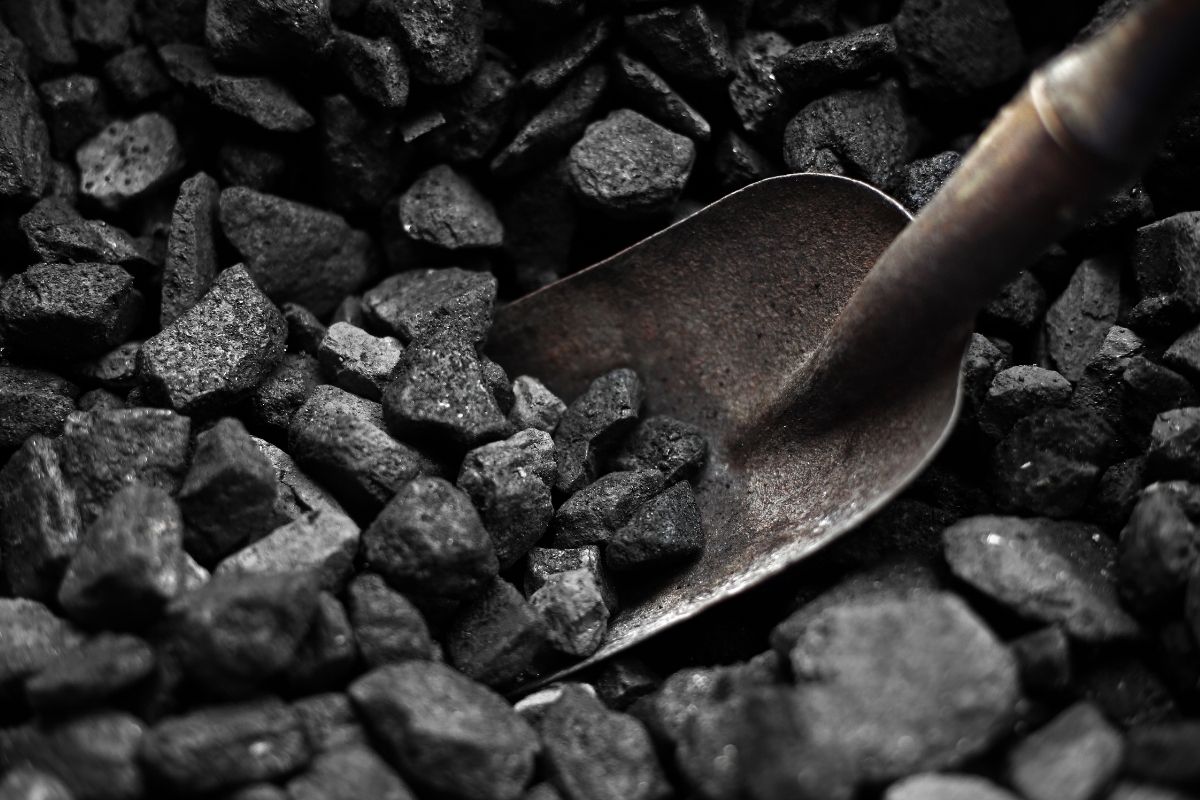Dogs will eat coal for a few reasons, the main one being that it probably has some food residue on it that he can smell and it smells good. Dogs will try anything that has a good food smell. Another reason for coal munching is that it can help to clean teeth and also help to relieve an upset stomach if he has eaten something that has disagreed with him.
Whether it’s ash from the fireplace or the remains of charcoal from the barbecue you may sometimes find that your dog takes a liking to these remains and you may wonder just what he is doing by eating coal.
What happens if a dog eats coal?
It’s not a great idea to let your dog eat coal or charcoal but neither will do him a great deal of harm unless he eats large amounts.
The most likely result is that he will be sick and you’ll need to be ready for this as it will be a big, black mess.
If your dog has swallowed lumps of coal or briquettes then you’ll need to contact your vet for advice as these will not digest and could cause an internal blockage if not treated properly.
Is it okay for a dog to eat coal?
Not really, coal can contain a wide range of toxins that can be harmful to your pet.
Your dog should not be allowed to eat coal or ash from either the fireplace or the barbecue.

Is coal poisonous to dogs?
Coal itself is not poisonous to dogs, but ingesting it can cause a range of health problems.
When dogs consume coal, it can lead to gastrointestinal issues such as vomiting, diarrhea, and abdominal pain.
Coal can also cause a blockage in the digestive tract, which can be very dangerous and require emergency veterinary treatment.
In addition, coal can contain other harmful substances such as heavy metals and chemicals that can be toxic to dogs if ingested in large amounts.
Therefore, it’s important to keep coal and other potentially harmful substances out of reach of your dog.
If you suspect that your dog has ingested coal or any other harmful substance, contact your veterinarian immediately.
What should I do if my dog eats coal?
If your dog does eat coal then you should consider the following:
Remove any remaining coal from the area and make sure that it is well out of the reach of your dog and other animals.
Give your dog some water and call the vet to get their advice. Don’t give your dog anything to eat.
Try to work out how much coal your dog has eaten. Was it a small piece? Ashes? or several lumps that could cause problems?
If your dog has swallowed lumps of coal then you need to call your vet. You’ll need to have an idea of the amount eaten, the type of coal – was it charcoal or household coal for example?
Your vet will be able to advise you as to the best course of action and may ask that you take your dog to the surgery for an examination.
Monitor your dog’s behaviour. You will need to keep a close eye on your dog for a couple of days looking out for any signs of vomiting, constipation, poor appetite and stomach pain.
When you take him out check for any signs of coal in his poo – if you see it then you know that it is ‘passing through’.
What to do if your dog eats coal
Remove any remaining coal or debris from your dog’s mouth: This will help prevent your puppy from ingesting more coal and help reduce the risk of choking.
Contact your veterinarian: Call your veterinarian and inform them about what has happened. They can advise you on what to do next and may ask you to bring your dog in for an examination.
Monitor your puppy: Watch your dog closely for any signs of distress, such as vomiting, diarrhea, or lethargy. These symptoms could indicate that your pet is experiencing complications from eating the coal.
Follow your veterinarian’s instructions: Always follow the advice that your vet provides. They are able to provide you with the best options for the care of your dog.
What are the symptoms of a dog eating coal?
Black vomit and black stools (or what appears to be blood in the stool)
Loss of appetite Pain and discomfort
Depending on how much your dog has eaten or how many different types of coal he is eating then other problems may also arise such as diarrhea, constipation and dehydration.
There is a risk of choking
Whenever your dog picks up an object there is always the potential risk of choking.
With something like coal, which can easily break into smaller pieces, this risk is increased as the coal can disintegrate inside your dog’s mouth.
As a pet owner, it is always a good idea to develop a basic understanding of dog first aid so that, in the event of a problem, you can intervene to help your pet.
You should also try to keep the coal bucket out of reach.
What are the treatments for a dog eating coal?
If your dog appears to be well apart from eating coal then you may not need any treatment. You can simply continue to monitor him and offer him plenty of water.
Your vet may ask that you bring your dog in for an examination but depending on what is found they may advise no treatment is necessary.
If your dog is sick then you’ll need to clean this up and offer him a drink of water. If he isn’t sick then you should take this opportunity to get some fresh water into him.
Your vet may prescribe medication for any vomiting, diarrhea or pain and discomfort caused by eating coal.
They may suggest special food in the form of an easily digestible diet or something bland.
If there is any blockage in the bowel or stomach then your vet will need to remove this via surgery. They may also give you medication to help get things moving again.
What if my dog eats charcoal?
Charcoal is very different from traditional coal in that it is a form of burned wood.
Although it is not ideal for your dog to consume charcoal it is less risky than the usual coal that is mined from the ground.
Due to it’s use on barbecues, there is a likelihood that your dog will be attracted to charcoal ‘coals’ as they can become tainted with sauces and other tasty items from the cooking process – so you should keep the barbecue well away from your pet.
As an aside, a form of charcoal is often used as a medical solution, for both dogs and humans, to help deal with problems that occur from things such as food poisoning.
So, although you should keep charcoal away from your dog, the consequences of eating it are less severe than with normal coal.
FAQs
Why do dogs eat coal?
Dogs sometimes eat coal due to a behaviour known as pica, which refers to the consumption of non-food items. They might be attracted to the smell or texture of coal, or it could indicate a nutritional deficiency. However, it’s not common behaviour, and if you notice it, you should consult your vet.
Is it harmful for dogs to eat coal?
Yes, coal can be harmful to dogs. It could cause intestinal blockage if swallowed in large pieces, and even small amounts can cause upset stomach or diarrhea. Coal also contains chemicals that could potentially be toxic if ingested.
What should I do if my dog has eaten coal?
If your dog has ingested coal, monitor for any signs of distress such as vomiting, diarrhea, loss of appetite, or lethargy. It’s advisable to contact your vet immediately. Depending on the amount consumed, it may be necessary to induce vomiting or even perform surgery in severe cases.
Can eating coal indicate a dietary deficiency in my dog?
Sometimes, pica (the act of eating non-food items) can be a sign of nutritional deficiencies, particularly in minerals. However, coal is not a beneficial source of nutrients. If your dog is consistently seeking out and consuming coal, it could mean they need a more balanced diet. Consult your vet for advice tailored to your dog’s specific needs.
How can I prevent my dog from eating coal?
Preventing access is the first step. If you use coal at home, store it securely out of your dog’s reach. Provide plenty of mental and physical stimulation to reduce boredom, which can lead to pica. Regular check-ups with your vet can help ensure that your dog isn’t experiencing any dietary deficiencies or health issues that might be causing this behaviour.
Before you go
If your dog has eaten coal then you’ll need to monitor him carefully for the next few days.
You’ll also need to contact your vet if there are any problems – they will be able to help and give you advice on how to treat any diarrhea, vomiting or pain.
If the problem is not treated properly it could cause further issues such as dehydration, poisoning or even a bowel obstruction.
Remember – your vet is the best person to speak to for advice and you should always contact them if you have any health concerns about any of your dogs or other pets.




